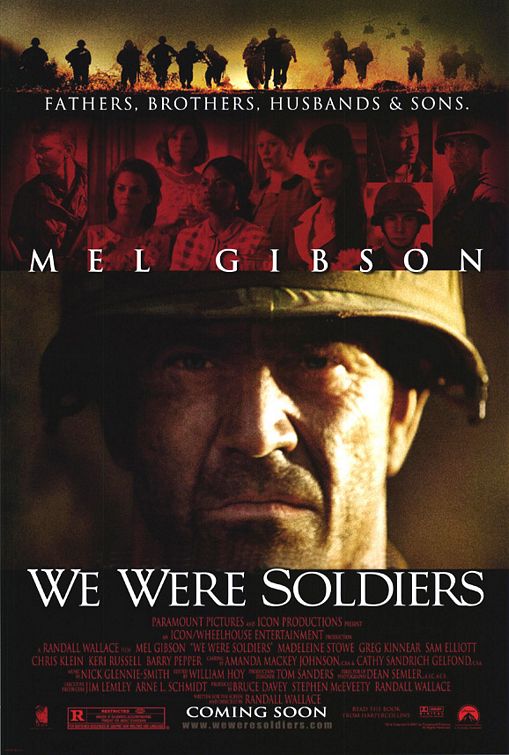“Memories of Christian Valor”

| None | Light | Moderate | Heavy | |
|---|---|---|---|---|
| Language | ||||
| Violence | ||||
| Sex | ||||
| Nudity |
What You Need To Know:
WE WERE SOLDIERS keeps you riveted to your seat. It’s another massive undertaking from the team that produced the Oscar winning movie, BRAVEHEART, Randall Wallace and Mel Gibson. Their Christian sympathies are clearly displayed in this patriotic, powerful movie, but the terrific battle sequences are complete with blood, obscenity and profanity. Mel Gibson’s character depends on God in a very personal way, however, which lifts this movie above the ordinary to the transcendently extraordinary and spiritually uplifting tale of courage valor and faith.
Content:
(CCC, BBB, PPP, PC, LLL, VVV, S, A, D, M) Strong overt Christian worldview with Roman Catholic and Methodist references and strong references and appeals to Jesus Christ and the Triune God of Christianity; strong American patriotism; very slight political correctness regarding the faith of non-Christians, but said in the vein of letting the Christian God be the ultimate judge of men’s hearts; about 33 obscenities (including three or four “f” words), 6 strong profanities and 3 mild profanities; very strong, very bloody war violence such as men shot in throat, head or chest, burn victim’s skin on legs falls off to the bone, gaping burn scars on two men’s faces, images of corpses and wounded men who are bleeding, surgeon’s gown covered in blood, groups of soldiers shot or napalmed severely, soldiers use bayonets, and many explosions; married couple tickle one another, kiss passionately and hold one another closely in bed; no nudity but man in T-shirt and woman in nightgown; alcohol use; smoking; and, nothing else really objectionable.
More Detail:
Mel Gibson plays Colonel Hal Moore, a brilliant Korean War veteran with a Harvard degree in international relations. A Roman Catholic with a Methodist wife, Col. Moore loves his family and God as much as he respects his chosen profession. At the slightest provocation, Hal turns to God with down to earth prayers that express his needs and his wants.
In 1965, Col. Moore is chosen to revolutionize military tactics in the Vietnam theater. For those who weren’t there, the North Vietnamese Communists had fought off the French in the 1950s and were now trying to recall South Vietnam under their control. The Americans had been sending in advisors. At the time, America did not want it to appear that the United States was at war in Southeast Asia so this was classified as merely an executive action to contain Communism. Col. Moore’s superiors order him to find out whether it would work to send soldiers in quickly via helicopter and withdraw them just as quickly. He trains these men at Fort Benning, Georgia, where the wives are an integral part of this unit.
When called to ’Nam, Col. Moore finds out what almost everyone now knows, that the politicians were not committed to a full prosecution of the war. Therefore, they do not issue the emergency orders that would keep his veteran, seasoned troops with the unit. Thus, except for a sergeant, many of the men he has to take into battle are wet behind the ears. In a telling scene at the going-away party, he mentions the true villains behind the scenes, the politicians, in passing. He knows he has been set up and suspects the worst when his unit is called the 7th Calvary, which, the audience is reminded, was Gen. Custer’s division.
In Vietnam, Moore sees immediately that the North Vietnamese are drawing his men into an ambush. Once on the ground, they are quickly surrounded by Vietnamese. One of his units is cut off. Courage and valor combine with his clear understanding of military tactics to keep him one step ahead of the enemy.
The enemy in WE WERE SOLDIERS is portrayed in a more human fashion in this movie than most of the other Vietnam movies. The scene of the enemy commander are reminiscent of TORA, TORA, TORA. There’s a humanity displayed, but the real heroes are the American fighting men and their families. Each one of them matters, and Col. Moore refuses to leave any behind, dead or alive. He wins the battle. Around three hundred sixty-five men hold off around 4,000 Vietnamese and, in fact, kill 1,800 of them, but only through his sagacious tactics under intense fire and the tough stamina of his men.
WE WERE SOLDIERS is another massive undertaking from the team that produced the Oscar winning movie, BRAVEHEART, Randall Wallace and Mel Gibson. Their Christian sympathies are clearly displayed in the story. From the moment that Col. Moore prays with his children, to the scene in the chapel where he prays with a new recruit, to his invocation of the Trinity, to his prayers on the battlefield, Mel Gibson’s character depends on God in a personal way. One soldier even goes so far as saying God has a plan for him, but he does not know what it is, so Col. Moore tells him to go ask God in prayer what that plan is.
In this context, the movie is a series of profiles in courage. It even profiles the courage of the women who lost their husbands and of the families that were left behind when their men went off to war. Col. Moore does make the statement once, however, that the enemy was praying to God in some other name according to their understanding, but this ignores the fact that the Communists are atheists and the Buddhists are non-theistic. This slight nod to political correctness is in the context of a larger speech pledging and invoking the Almighty in the name of Jesus. Thus, the Christian God is the ultimate judge of all men’s hearts in the movie.
There are some terrific battle sequences in WE WERE SOLDIERS, but they are complete with blood, obscenity and profanity. Some of the bloodshed is very hard to take. There are scenes where soldiers are graphically burned by napalm or phosphorous and scenes where soldiers are shot in the throat, chest or head. WE WERE SOLDIERS is not a PG-13 movie, or for the faint of heart. Compared to other recent war movies, however, the foul language is not as graphic or as numerous, though it is very strong at times.
Much of the acting in WE WERE SOLDIERS is tremendous, showing better direction by Randall Wallace than anything he’s done before. Mel’s moments with his children, his times of prayer, his compassion for his troops, his leadership display consummate skill in becoming the character, Hal Moore. Sam Elliott, Madeleine Stowe, Greg Kinnear, and the other actors and actresses also perform quite well. There are some flaws, however. Mel gives some of his incredulous looks once too often, and somebody needs to remind him of his wonderful acting skills in movies like HAMLET. The scenes with the wives were probably intended to be realistic, and they are just that almost to a fault, diminishing the dramatic with hyper-realistic chit chat. These, however, are very minor quibbles. Most of the movie keeps you riveted to your seat. Some of the movie will even get you to jump out of your seat.
Finally, for those who have been to Southeast Asia, the terrain in WE WERE SOLDIERS does not always reflect the dark, lush quality of Vietnam. Even so, the staging of the battle and the filming are totally compelling. By the end of the movie, much of the screening audience was waiting for the very last frame, which seldom happens.
WE WERE SOLDIERS should be an Academy Award nominee next year. For mature audiences, it is a must see movie, a great film about faith and valor in memory of the men who lost their lives in the thankless battles in Vietnam.


 - Content:
- Content: 





